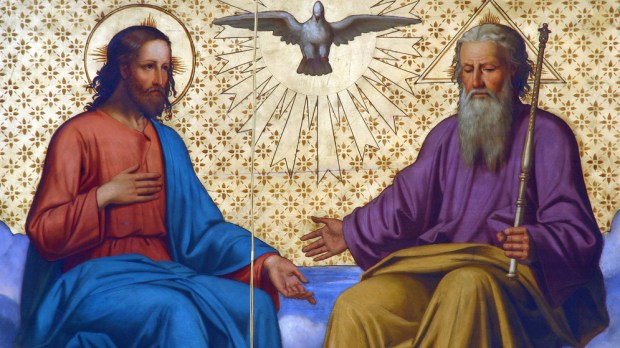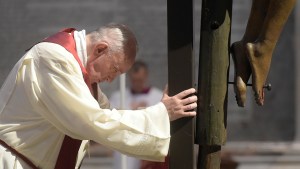In our community, we always have a Catholic seder on Holy Thursday. Before Holy Week, I couldn’t help but notice that our local store already started stocking matzoh, and I was proud of myself for being ahead of the game. I held a box in my hand, studying it, wondering how authentic it really was, when I heard a woman’s voice behind me: “Are you buying matzoh, Sister?”
I turned around to see a woman with a confused look. Of course–why would I, obviously a Catholic Sister, be buying matzoh for Passover?
I explained to her the notion of a Catholic seder: elements of the Passover are infused with the readings of the New Testament to shed light on how God promises a new covenant, in Jesus. I secretly held my breath, hoping I wasn’t burning a bridge. We struck up a conversation, and I learned she was Jewish. Like the Catholic nerd I am, I busted out any lingo I knew could reach a common denominator.
“Oh, we love the Jewish culture! It helps inform our understanding of Christianity, where we came from … I mean, I know the Sheema.”
“Oh, you mean the Shemah?”
“Yes! The Lord is our God, the Lord is one. Therefore, you shall love the Lord your God with all your heart, all your soul, and all your strength …”
Without hesitation, she responded: “Now … don’t you believe that God is three people? There’s a Father, a Son, and a Spirit? How can you say that, and still say that He is one?”
And that was how I found myself attempting Trinitarian theology in a grocery store one Monday morning. In case you’re wondering how it went, I can only say that God gave the grace I needed in that moment.
Getting the Trinity wrong leads to getting humanity wrong.
A squeamish topic
Talking about the Trinity always makes me feel squeamish. It feels like one slight slip of wording can land me in destructive heresy that someone, somewhere was slapped on the hand for. And yet, it’s right for the sacredness of His identity to be protected with utmost discretion; the Blessed Trinity is not only our source, containing the blueprints for communion that undergird our whole humanity, but also our destiny, for every human person is created for union with the Trinity.
Pope Benedict XVI says,
“We do not understand man when we ask only where he comes from. We understand him only when we also ask where he can go. Only from this is his height really illuminated.”
In summary, getting the Trinity wrong leads to getting humanity wrong.
We know that the Holy Trinity is a communion, an eternal exchange of divine love. The Father gives Himself wholly to Jesus the Son, who reciprocates this self-gift to the Father, their love being so fruitful and complete it forms a third person, the Spirit of them both.
As St. Augustine categorized them, the three persons are “Lover, Beloved, and Love.”
Through Jesus’ Incarnation, and by our baptism, we are swept up in this Trinitarian love, and we have the capacity to offer our own self-gift to the Father as Beloved with Jesus, through His Spirit.
We are steeped in His own intimate conversations with the Father: “I will make it known, that the love with which thou hast loved me may be in them, and I in them.” (John 17:26)
But what does it really look like to live Trinitarian love, in the flesh? The humanity of Jesus paved a way for us to enter Trinitarian life.
First, being beloved
This bears repeating. Over, and over again. Our movement towards God is always a response to His divine Initiative. As St. John tells us, He loved us first. And His love for us is unconditional, unchanging, and even radical.
In Jesus, who invites us into this love, we see Him live in confident trust as a Son, “Father, I thank you for hearing me. I know you always hear me” (Jn 11:41-42), and in a spirit of praise of His fatherly goodness: “I thank you, Father, Lord of heaven and earth, for you have hidden these things from the wise and understanding and revealed them to babes” (Mt 25:11).
The multitude of examples grow if we include the voice of the Son, the Word made flesh, crying out to the Father in the Old Testament, especially the Psalms. In the face of a very bleak picture, He cries out in confident trust, while not discounting the suffering: “I am afflicted and in pain … I will praise the name of God with a song; I will magnify Him with thanksgiving!” (69:29-30)
We see Him remaining grounded in His Sonship, most poignantly in the temptations in the desert, where His primary identity was vehemently attacked: “If you are the Son of God …” (Mt 4).
Jesus has given us the capacity to live as Beloved with Him, with confidence in the Father’s providential care.
Ask yourself honestly: Where do I live in the spirit of orphanhood?
Or the spirit of scarcity or self-reliance, where I buy into the lie that I’m not enough, and don’t have enough, and the Father won’t provide, so I must provide for myself? Where do I give in to the temptations to let the toxic lie of envy and comparison wreak havoc on myself and my communion with others? Where do I give into the Enemy’s attacks against my very identity as child of God, where I let the lie creep in that I don’t belong, or I’m not good enough?
Ann Voskamp, author of One Thousand Gifts, writes, “When we’re rejected and abandoned and feel beyond wanting, Jesus cups our face: Come close, my Beloved.”
He’s always drawing us in to know the Father’s love, coaxing us in His tender way to let go of the things that bind us from living as His freed children.
Fr. Dave Pivonka, T.O.R speaks of a time his 8-year-old cousin shared a helpful insight on Jesus, letting the children come to Him:
“I asked why Jesus may have said this. My cousin Becky stated, ‘Maybe it’s because big people complicate God, and he is not so complicated” (Breath of God).
It doesn’t need to be complicated. Like St. John, become like a child, and rest on the heart of the Beloved Son, asking Him to teach me how to let myself live as Beloved.
Giving
As John Paul II famously stated, “Man cannot fully find himself except through a sincere gift of self” (Gaudium et Spes, 24).
We know even in a secular realm the power that comes from forgetting ourselves to reach out to another. It’s often in periods of crisis, such as the war in Ukraine, or community tragedies, that we see the strength of human character; strangers band together for a common good beyond themselves, sacrificing to uphold one another.
But we know authentic community is more than just the “high” one gets from volunteer work; it must be rooted in the Spirit, the bond of Love Himself, who conforms us to Himself so that our self-gift can be truly like His: self-forgetful, generous, and gratuitous. This deepens when we live out our calls as spouses and parents, biologically and/or spiritually.
As Christians, we manifest the love of the Trinity in our communities to the world.
Or, at least, we’re supposed to.
The reality is that giving the gift of ourselves to others can be draining, and even frustrating, when we sense that we give a lot without really getting much back. Parents easily spend years, miraculously functioning on little to no sleep, caring for their children. Caregivers can go day after day giving to their elderly or disabled family member or spouse, forgoing their own human needs. What happens when we give ourselves, but seemly still haven’t “found ourselves”?
“I am very sure–oh, yes indeed!–that He will never say to me, ‘You hoped too much of me.’ I cannot imagine Jesus saying that.”
Take the case of Elisabeth Leseur, whose beloved husband became a hostile atheist during medical school. He constantly berated her for her faith, even shoving into her hands anti-Catholic reading material to show her silly her faith was. Still, she loved her husband, and the darkest moments did not smother her hope for his conversion.
One day, she said,
“I shall die before you. And when I am dead, you will be converted; and when you are converted, you will become a religious. You will be Father Leseur.”
What her husband, Felix, didn’t know is that all the stabs of persecution and sorrow from his criticism was being offered by her in self-gift to the Father for his conversion. And, years after she succumbed to breast cancer, he did convert. He later entered the Dominicans, even directing Bishop Fulton J. Sheen for a retreat.
Christ promises us:
“the certainty of being infinitely loved, and the certainty of being capable of loving without limits. Nothing except the Cross of Christ can give in a full and definitive way these two certainties and the freedom they bring.” (Fraternal Life in Community, 22).
When the suffering of offering a difficult self-gift cannot be alleviated, here lies the opportunity to make an act of faith, trusting that nothing is ever lost when our offering is united with Christ’s to the Father.
Whether we see it in this life or the next, His fidelity is always greater than our human weaknesses, and we can lean on His Word that He will bear fruit, not simply in us, but in the hearts of those we seek to love.
Trust me; He’s flattered by our confidence in Him.
Fr. Jean d’ Elbèe, in I Believe in Love, says,
“I am very sure–oh, yes indeed!–that He will never say to me, ‘You hoped too muchofme.’ I cannot imagine Jesus saying that.”
Do I believe that if He has called me to this, He will sustain me with His grace? Even if it doesn’t feel the way I hope? Do I not merely lean on Him, but cling to Him, whispering, “Jesus … it is You who must do this in me”?
John Paul II exhorts us:
“Do not be afraid, then, when love makes demands. Do not be afraid when love requires sacrifice.”
We can be scandalized by our own poverty when we come face to face with the real demands of love. Yet this is where we find the greatest intimacy, when we vulnerably hand ourselves over to God through loving and being loved by others.
In Jesus, we have been given a way to enter this divine exchange of love in our own humanity — a place of often hidden sanctity, but radiant glory. Let us not resist the work of the Sanctifier, conforming and transforming all our acts of love, that they may incarnate His own love for mankind.


